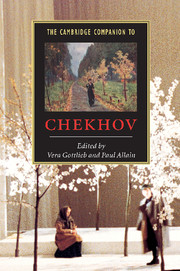Book contents
- Frontmatter
- Part 1 Chekhov in context
- 1 Dr Chekhov: a biographical essay (29 January 1860-15 July 1904)
- 2 Chekhov and his Russia
- 3 Chekhov at the Moscow Art Theatre
- Part 2 Chekhov in production
- Part 3 Chekhov the writer
- Appendix 1 Chekhov's works: primary sources from the Russian - Variations of English titles from the Russian
- Appendix 2 Selected stage productions
- Appendix 3 Selected screen versions
- Appendix 4 Illustrations
- Selected bibliography
- Index of Works by Checkov
- General Index
2 - Chekhov and his Russia
from Part 1 - Chekhov in context
Published online by Cambridge University Press: 28 May 2006
- Frontmatter
- Part 1 Chekhov in context
- 1 Dr Chekhov: a biographical essay (29 January 1860-15 July 1904)
- 2 Chekhov and his Russia
- 3 Chekhov at the Moscow Art Theatre
- Part 2 Chekhov in production
- Part 3 Chekhov the writer
- Appendix 1 Chekhov's works: primary sources from the Russian - Variations of English titles from the Russian
- Appendix 2 Selected stage productions
- Appendix 3 Selected screen versions
- Appendix 4 Illustrations
- Selected bibliography
- Index of Works by Checkov
- General Index
Summary
The geographical settings in Chekhov's literature are extensive: his characters are found in small villages; in provincial towns; on a nobleman's estate; in the two 'capitals' - Moscow and St. Petersburg; in the Caucasus and the Crimea, Siberia and Sakhalin. There are also endless roads and numerous encounters on country lanes, tracks on the steppe, and encounters in railway stations and on trains.
No less diverse is the social world populated by his characters: intellectuals, merchants, peasants, landlords, shepherds, fishermen, firemen, military of all ranks and civil servants of all grades, policemen and thieves, actors and scholars, students, doctors, teachers, lawyers and clergymen - of different generations, ages, levels of education and culture.
But the geographical dimension, the social backgrounds and professions are not as important as Russia's inner state and the way this shapes people's individual destinies. The purpose of this chapter is precisely to explore this interdependence, while the subject may be defined as 'turn-of-the-century Russia' through Chekhov's eyes or - to put it another way - 'Chekhov's images of Russia'. This interdependence is explored from a variety of perspectives: the vastness of Russia's territory and the abundance of its nature as the Russians' existential context, and Russia in the contexts of the world, and of the universe. Chekhov's judgements are never categorical or blunt, just as the symbolic 'images' of Russia are never unequivocal, and reflect the complexities and controversies, the combination of light and darkness, good and evil, that typify the Russian way of life and Russian sensibilities at that time.
- Type
- Chapter
- Information
- The Cambridge Companion to Chekhov , pp. 17 - 28Publisher: Cambridge University PressPrint publication year: 2000

